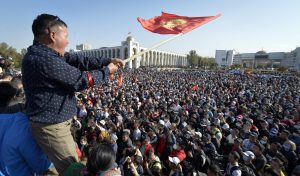Kyrgyzstan has a new prime minister, kind of — maybe not?
According to a statement put out by the parliament’s press service, Sadyr Japarov was elected prime minister by an extraordinary meeting of the parliament in the Dostuk Hotel in Bishkek on October 6. Media were barred from entering and it’s unclear which and how many members of parliament were physically present to vote. Japarov was freed from prison earlier in the day; he’d been behind bars since 2017 on an 11.5-year sentence for kidnapping a regional governor in 2013. The newly minted prime minster reportedly slipped out the back door of the hotel after the vote. Perhaps he was uncertain whether the mob at the front were his supporters or opponents.
The parliament was meeting in the Dostuk Hotel in part because protestors had, in the unrest that broke out on the evening of October 5, stormed the Kyrgyz White House, which hosts the presidential and parliamentary offices.
On Twitter, Edil Baisalov, Kyrgyzstan’s ambassador to the United Kingdom, asked international media to “to refrain from assigning any official status to various reports about Kyrgyz Government appointments until they are adopted by the parliament with required decorum and due process and confirmed by the head of state as required by law.”
Uncertainty is king at the moment in Kyrgyzstan. 24.kg, a local media outlet, led an an article about the events of October 7 with: “Anarchy reigns for the second day in Kyrgyzstan.” Noting vacated official positions, the brief introduction to a live feed of updates notes that President Sooronbay Jeenbekov has not resigned. Several so-called coordinating councils have sprung up, but 24.kg comments that the parliament remains the only “legitimate” power. Parliament, however, has not been able to meet with a necessary quorum.
Parliamentary rules very well could be shoved aside; they certainly don’t matter much to Japarov’s supporters in the streets of Bishkek, or to the groups of men reportedly roaming the streets bent on plunder. Eurasianet’s Peter Leonard reported, however, that “volunteer brigades known as the druzhinniki” had prevented them from ransacking businesses in Bishkek.
So what’s next? I’d be a complete fool to say anything for certain. What can be observed, however, is the emergence of several factions or nodes of power. The wrangling between them, and which group ultimately comes out on top, will point the way.
On Twitter, Kyrgyz political analyst Asel Doolotkeldieva frankly remarked: “I don’t know how you guys follow what’s happening now in #KyrgyzRevolt, it’s totally confusing for the participants themselves. Contestations of power are far from being structured: parties and politicians are constantly migrating from one contesting center to others. Chaos.”
But Doolotkeldieva, nevertheless, started to brainstorm the several “centers of power” that are emerging and the following develops further on her comments on Twitter.
There’s clearly a faction behind Japarov with some sway among a portion of parliament. Whether that’s enough to make Japarov prime minister is unclear. As Baisalov noted, and others have pointed out, there’s a distance between being named prime minister in a hotel backroom and actually being prime minister — most importantly, presidential approval.
Speaking of the president, Jeenbekov arguably remains a “center of power” though he seems to have stepped out of view while likely hoping the chaotic political storm will blow itself out. From a “secret hideaway” Jeenbekov gave an interview to the BBC’s Kyrgyz Service. In his comments, the president alleged that the protesters weren’t bent on annulling the parliamentary election results but unseating him from power. Here we hear echoes of nearly every Kyrgyz president paranoid (rightfully so, perhaps) of being overthrown. “To solve this issue, I am ready to give the responsibility to strong leaders, no matter which group they belong to. I am even ready to help them,” Jeenbekov said, seemingly trying to fit himself into whatever future unfolds in the country without trying to participate in its formation.
Then there’s the Coordination Council (there is more than one, so buckle up for more confusion) which emerged from a meeting of several opposition parties. Butun Kyrgyzstan’s leader Adakhan Madumarov is at the head of one such council. As Bruce Pannier has observed, the Coordination Council is virtually all old men.
There are also the youth and younger parties and politicians to consider. On October 7 protesters gathered in Ala-Too, Bishkek’s iconic central square, calling for a “clean” generation of politicians to take charge. They appeared to support businessman Tilek Toktogaziev for the prime minister seat. 24.kg reported that Toktogaziev was “elected acting head of Government” by the People’s Coordination Council, another council established by the leaders of Chon Kazat, Ordo, Meken Yntymagy, and members of Reforma and Yiman Nuru
RFE/RL reported that the People’s Coordination Council said it “would not recognize Japarov’s interim cabinet and was assuming all state powers itself and dissolving parliament.”
Other nodes of power are less obvious on the surface but no less important. For example, the corrupt, criminal elements allegedly behind the mass vote-buying that touched off the protests in the first place. There was a rumor that Raimbek Matraimov, a former deputy customs head who had been implicated by investigative reports in a massive corruption scheme and was said to be the funder behind the Mekenim Kyrgyzstan party, had fled the country. It is not clear whether that’s true or not.
And yet more “centers of power” like Russia and China are obvious but far less important at this juncture. On October 7, Russian President Vladimir Putin commented on the Kyrgyz matter in bland terms. As Reuters reported: “Russian President Vladimir Putin said on Wednesday Moscow was concerned by political unrest in Kyrgyzstan and hoped for a swift return to stability.”
So what’s next?
Given that the Central Election Commission has annulled the October 4 election results, we can be certain that another election is coming, eventually. Everything else remains in flux.

































